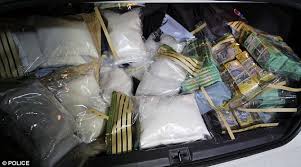Drug Supply
You are here: Home » Drug Charges » Drug Supply
Drug Supply
According to Section 25 of the Drug (Misuse and Trafficking) Act, it is a criminal offence to supply or knowingly take part in the supply of a prohibited drug.
The offence of drug supply covers a number of different activities, including selling drugs, distributing drugs, receiving or developing drugs for supply, sending drugs to someone else, and agreeing to supply drugs. This offence also covers the storage of drugs intended for supply.
Pleading Not Guilty
If you wish to fight the charges against you, you will need to plead not guilty and defend yourself in court. The matter will then go to a defended hearing in front of a magistrate or judge.
Defences
Many drug supply charges are based on circumstantial evidence, which often has weaknesses. In the case of circumstantial evidence, the prosecution needs to prove beyond a reasonable doubt that the only explanation was that the defendant was supplying drugs.
These charges can often be successfully defended by pointing out the deficiencies and gaps in evidence and providing a more reasonable explanation.
Pleading Guilty
If you agree to the charges against you, pleading guilty can help you get a more positive outcome, or even avoid a conviction altogether with a section 10 dismissal or conditional release order. Pleading guilty shows that you accept responsibility for your actions, and alongside demonstrated remorse, may encourage the magistrate to look more favourably on you.
Penalties
Drug supply can come with harsh penalties, depending on the type and quantity of drugs involved. For an indictable quantity of drugs, there is a maximum penalty of 15 years’ imprisonment and/or a fine of $220,000. For a commercial quantity, the maximum penalty increases to 20 years in prison, and/or a fine of $385,000. For a large commercial quantity, you face life imprisonment and/or a fine of $550,000.
Other less serious penalties for drug supply include:
– Good behaviour bonds
– Community service orders
– Suspended sentences
– Intensive correction orders
– Home detention
Why Sydney Drug Lawyers?
If you’ve been charged with drug supply, you can benefit from the knowledge and experience of the drug law specialists at Sydney Drug Lawyers.
Our lawyers specialise exclusively in drug law, which means that we have the in-depth knowledge and experience to ensure that you get the best possible result in your supply case. Unlike other law firms, our specialist drug lawyers are able to obtain ‘non conviction orders’ in supply matters, which is where you are found guilty of supply but you don’t receive a conviction on your criminal record.
So if you are facing drug supply charges, make sure you find the best possible legal advice and assistance. Contact one of our experienced drug lawyers today.
Recent Drug Supply Cases
Our client is a 24 year old physical education student.
Police say they observed him entering a ‘known drug premises’ and exiting a short time later with a package.
They followed his car and pulled him over a short time later. They asked whether he had any drugs in the car, to which he replied ‘some steroids’.
They then search his car, located the package on the passenger seat, and within it found a total of 800 Dianabol (steroid) tablets, a 10 ml vial of Sustanox X250 (a steroid) and approximately 1 gram of cannabis.
Our client was then charged with three counts of drug possession in respect of the substances. Given the state of the evidence and our client's admissions, and after some alterations were agreed by the prosecution to the 'full facts', pleas of guilty were entered to the charges.
Our client instructed that he was "obsessed" with his body image. Accordingly, we arranged for him to see a psychologist, who diagnosed him with ‘body dysmorphia’.
He continued seeing the psychologist in the lead-up to the sentencing hearing, and we obtained a report about his underlying issues and the steps he taken towards address them.
We also assisting him to prepare a letter to the court which outlined his acceptance of responsibility, his remorse and his efforts towards rehabilitation. We also helped him in obtaining character references in the proper form.
Despite the quantity of drugs and number of charges, we ultimately persuaded the magistrate to place him on good behaviour bonds for a period of two-years without recording a criminal conviction against his name.
Our previously-anxious client is now confident that his studies will lead to employment as a teacher or instructor.
Our client is a foreign national on a working holiday visa.
A few months into her stay in Australia, she decided to attend a music festival with a group of friends.
On the day of the festival, she was pressured to carry 14 MDMA (‘ecstacy’) tablets into the festival grounds.
The male members of the group, including her boyfriend at the time, felt that as a female she would come under the least suspicion from security and police, who were checking for illegal drugs at the festival entry.
A sniffer dog gave a positive indication and our client quickly admitted to possessing the tablets.
She was then arrested and charged with ‘drug supply’ due to the number of tablets found. In that regard, the law provides that a person found with more than the ‘trafficable quantity’ of drugs can be charged with supply. This is known as ‘deemed supply’. The trafficable quantity of MDMA is just 0.75 grams.
If a person is charged with deemed supply, the onus of proof then shifts to them to prove ‘on the balance of probabilities’ that they were in possession of the drugs for the purpose of something other than supply.
The law also provides that a person who holds drugs momentarily for the owner with a view to returning it is not guilty of supply.
An issue for our client was that there were a number of people to whom the drugs were to be distributed upon entry to the festival, and she made admissions to police that she intended to supply the tablets to these people.
Despite the issues, our defence team wrote a detailed letter – known as ‘representations’ formally requesting withdrawal of the supply charge provided that our client pleaded guilty to drug possession.
She pleaded guilty to that lesser charge and we assisted her in gathering a range of subjective materials, including documents in relation to the impact of a criminal conviction.
After extensive verbal submissions in the local court, and despite submissions against a ‘non conviction’ by the prosecution, Her Honour was persuaded to impose a two-year good behaviour bond without a criminal conviction.
This is an excellent result given the number of tablets involved.
Our client is a 27-year-old apprentice plumber from Sydney.
Police observed him walking along a footpath with another person outside a popular annual music festival. As our client was adjusting his pants, a single brown pill fell out of his pocket onto the ground. Police saw this, approached and showed him identification. Our client then handed the pill to police, admitting it was ‘ecstacy’.
Police asked whether he had any other pills, and our client produced a bag containing another five ecstasy pills. Police then searched him and found another bag containing 6 more ecstasy pills. He made admissions to police that he was going to give some of the pills to his girlfriend and friends, which amounts to 'drug supply' under the law.
In total, our client was found with 12 ecstasy pills. As this is well above the ‘trafficable quantity’ of 0.75 grams – and the fact our client admitted intending to supply pills to others - our client was
charged with ‘deemed supply’, which means he was taken to have the drugs upon him for the purpose of supply.
Our client pleaded guilty in the Local Court and, because the quantity was also above the ‘strictly indictable’ weight of 1.25 grams, the case proceeded to the District Court.
Our client told us he saw several criminal lawyers who each advised him that it was not possible to avoid a criminal conviction for a ‘deemed supply’ for so many ecstacy pills. In our view, that advice was contrary to several authorities in the NSWCCA and District Court which make it clear that higher courts can, and indeed have, exercised discretion under section 10 of the Crimes (Sentencing Procedure) Act 1999 not to record a criminal conviction for the supply of several ecstacy tablets (see especially R v Mauger).
We assisted our client to prepare a range of favourable materials, including character references, a letter of apology and evidence that he may lose his job upon receiving a criminal record.
In the District Court, the prosecutor presented several cases which state that a prison sentence is appropriate in circumstances similar to that of our client.
In addition to the subjective materials, we presented cases to the contrary and argued at length that it was appropriate for the court to deal with our client by way of a section 10 good behaviour bond.
In the result, the Judge was persuaded to exercise her discretion and place our client on an 18-month bond without recording a criminal conviction against him.
He looks forward to continuing his career and establishing his own business in the future.
Our client is a 58-year-old lady who owns a tobacconist store in the CBD.
Police had previously seized synthetic drugs from her store, and had received further reports that synthetic cannabis was still being sold.
They obtained a warrant to search the premises and were able to locate various forms of synthetic cannabis, with an estimated value of $10,000.
Our client was then charged with ‘deemed supply’, which means that she was alleged to have more than the ‘traffickable’ quantity of drugs in her possession for the purpose of supply. A ‘deemed supply’ charge can be brought even if there is no evidence that the person actually supplied any drugs.
The laws relating to the sale of synthetic cannabis were changing at the time, and the act of supplying synthetic cannabis had only become an offence 10 days before our client was charged.
Our lawyers were able to persuade the prosecution to drop the charges on that basis, meaning that our client is spared the expense, stress and anxiety of having to fight the case in court.
Our 23 year old client has been granted conditional bail in Central Local Court after being charged with 'supplying a large commercial quantity of prohibited drug' and 'knowingly participate in criminal group'.
Police conducted a controlled operation into the alleged production and supply of methylamphetamine originating out of a clandestine laboratory in Ryde, NSW.
Police used surveillance devices and physical monitoring to track the movement of substances from that location to other parts of Sydney.
Our client was arrested together with four other young men who were allegedly in possession of 2.4 kilograms of methylamphetamine.
It is additionally alleged that our client is captured on surveillance footage handling the packages within which the drugs were found.
All five defendants then came before the Presiding Magistrate in Central Local Court.
They all faced an uphill battle when it came to bail because 'large commercial drug supply' is one of the offences captured by the new "show cause" provisions of the Bail Act - which means that it is very difficult to obtain bail in such cases.
However, our senior lawyers made extensive verbal submissions which ultimately convinced the Magistrate to grant bail to our client.
All of the other four other defendants were refused bail.
It is just another example of how superior legal representation can make all the difference when it comes to your liberty.
Videos on Drug Supply


